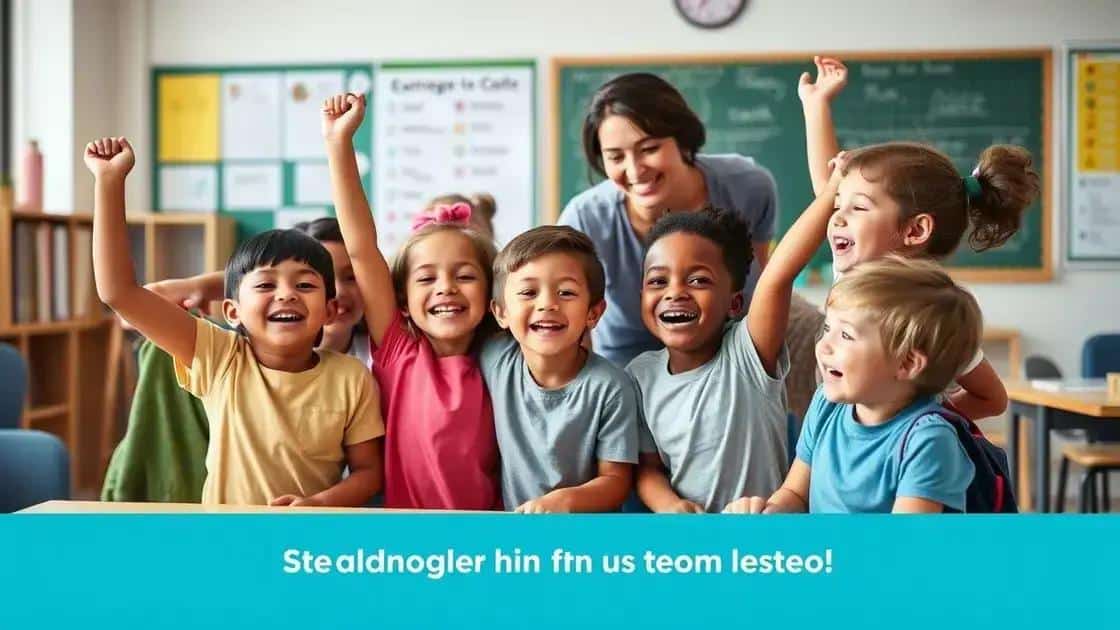early intervention programs for learning disabilities: why they matter

Early intervention programs for learning disabilities provide essential support that significantly enhances children’s academic performance, boosts self-esteem, and fosters social skills, leading to successful outcomes in their development.
Early intervention programs for learning disabilities play a vital role in shaping the futures of many children. Have you ever wondered how these programs can change lives? Let’s explore their impact together.
understanding learning disabilities
Understanding learning disabilities is essential for parents, educators, and the community. These disabilities affect the way a person processes information. Recognizing the signs early on can help in providing the necessary support.
What are Learning Disabilities?
Learning disabilities refer to a wide range of difficulties that impact learning. They can affect reading, writing, math, and even social skills. Some common types include:
- Dyslexia: Difficulty in reading and interpreting words.
- Dysgraphia: Challenges with writing and fine motor skills.
- Dyscalculia: Difficulty with understanding numbers and math concepts.
Many people with learning disabilities have average or above-average intelligence. They may excel in areas outside of traditional academics but struggle with typical learning environments. This discrepancy can be frustrating for both students and teachers.
Signs of Learning Disabilities
Early signs of learning disabilities can often be seen in preschool or early schooling. It’s important to look for:
- Delayed speech or struggling with language development.
- Difficulty with reading or spelling.
- Trouble understanding numerical concepts and performing basic math.
- Challenges in organizing thoughts or written work.
By being aware of these signs, parents and educators can take proactive steps to support affected children. Early intervention is key to helping children manage and overcome their challenges. Effective programs can help improve skills in areas where they struggle.
benefits of early intervention

The benefits of early intervention are significant and can have a long-lasting impact on children with learning disabilities. When specific challenges are addressed early, children can develop the skills they need to succeed.
Improved Academic Performance
One of the most noticeable benefits is improved academic performance. Early intervention helps children grasp fundamental concepts, making it easier for them to keep up with their peers. They learn to read, write, and solve problems more effectively.
Boosted Self-Esteem
Many children with learning disabilities struggle with self-esteem. Early intervention strategies can provide support and encouragement, helping them feel more confident. This change creates a positive attitude towards learning and life.
- Children often feel more capable when they receive help early.
- Supportive environments foster resilience.
- Success in small tasks builds confidence.
Additionally, these programs promote social skills. Children learn how to communicate better and interact more effectively with others. With this guidance, they can form lasting friendships and collaborative relationships with peers.
Tailored Learning Strategies
Each child is unique, and early intervention allows for customized approaches to learning. Specialists can identify strategies that work best for each individual. These personalized methods ensure that children can learn in ways that suit their styles.
Moreover, intervention programs often involve families, creating a support network. This engagement helps parents understand their child’s needs, empowering them to be involved in their child’s education. Strong familial involvement can greatly enhance a child’s learning journey.
how to access intervention programs
Knowing how to access intervention programs can greatly benefit families seeking help for children with learning disabilities. These programs offer essential support, but finding the right one can feel overwhelming.
Research Local Options
The first step is to research local programs. Many communities offer specialized services that cater to children with learning disabilities. This can include public schools, private organizations, and non-profits dedicated to education and intervention.
Utilize School Resources
Schools are often the best starting point for accessing intervention programs. Contacting your child’s school can yield valuable information about available resources. Teachers and counselors can help guide families through the process.
- Ask about special education services.
- Inquire about available assessments and evaluations.
- Find out about any partnerships with local intervention programs.
Additionally, online resources can provide insight into state-funded programs. States often offer directories or lists of approved intervention service providers. Visiting official education websites can help you find specific programs that meet your child’s needs.
Connect with Support Groups
Joining local support groups can provide families with recommendations and advice. Other parents often share their experiences and can point you to effective programs. Connecting with advocacy groups can also raise awareness about available services.
Obtaining referrals from professionals who specialize in learning disabilities can also be helpful. Therapists and psychologists can recommend reputable programs tailored to your child’s specific challenges. Building a network of support can streamline the process and ensure your child gets the best help possible.
success stories of effective programs

Success stories of effective programs highlight the positive impact of early intervention on children with learning disabilities. These inspiring accounts serve as powerful examples of how timely support can change lives.
Case Study: Tom’s Journey
Take the story of Tom, a boy diagnosed with dyslexia. With early intervention, he received specialized reading assistance and strategy training. Over time, Tom not only improved his reading skills but also gained confidence in his abilities. His transformation illustrates the potential of targeted programs.
A School’s Commitment
Another impressive example comes from a local school that implemented an intervention program for students with learning disabilities. They began offering workshops for teachers to better understand these challenges. After just one year, 80% of participating students showed remarkable progress in their academic performance.
- Students learned coping strategies effectively.
- Increased collaboration among staff improved program outcomes.
- Parental involvement encouraged a supportive home environment.
This initiative created a culture of understanding within the school, ultimately fostering a more inclusive environment for all students.
Community Support Programs
Community programs also play a significant role in success stories. One nonprofit organization focused on after-school tutoring for children with learning disabilities offers personalized learning experiences. Testimonials from parents report significant growth in their children’s skills and attitudes toward school.
By joining these programs, children not only improve academically but also build friendships and social skills. These stories of success showcase the importance of community support in aiding children through their learning journeys.
In summary, understanding and utilizing early intervention programs for children with learning disabilities can lead to remarkable transformations. These programs provide crucial support, foster confidence, and enhance academic skills. Success stories from various communities demonstrate that with the right resources and early action, children can thrive. Remember, accessing these programs and advocating for your child’s needs is the key to unlocking their potential.
FAQ – Frequently Asked Questions about Early Intervention Programs for Learning Disabilities
What are early intervention programs?
Early intervention programs are specialized services designed to support children with learning disabilities, helping them develop essential skills.
How can I find the right intervention program for my child?
Research local options, ask your child’s school for resources, and connect with parent support groups to find suitable programs.
What benefits can my child expect from these programs?
Children often experience improved academic performance, boosted self-esteem, and enhanced social skills through early intervention.
Are there success stories from these programs?
Yes, many children have made significant progress in their learning and personal growth thanks to effective early intervention programs.





